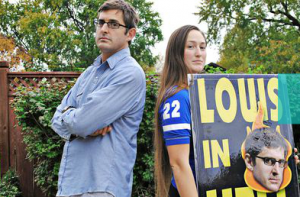 Terrible déjà vu hit me as I recently watched the BBC doco Return to the Most Hated Family, also known as The Most Hated Family In Crisis (sequel to The Most Hated Family in America) with interviewer Louis Theroux. Australians at least can catch the documentary over the next few days at iview. My own cult was never as offensive as the subject of this film: we certainly never publicly demonstrated at funerals gloating over dead soldiers in the belief we were righteously rejoicing in God’s judgments. But I could understand how these devout believers could bring themselves to do just that.
Terrible déjà vu hit me as I recently watched the BBC doco Return to the Most Hated Family, also known as The Most Hated Family In Crisis (sequel to The Most Hated Family in America) with interviewer Louis Theroux. Australians at least can catch the documentary over the next few days at iview. My own cult was never as offensive as the subject of this film: we certainly never publicly demonstrated at funerals gloating over dead soldiers in the belief we were righteously rejoicing in God’s judgments. But I could understand how these devout believers could bring themselves to do just that.
But that’s not the point of this post. What really pained me was the way Theroux was able to expose the deep human tragedy inflicting these people trapped in their conviction that they were doing God’s will.
Parents had thrown their children out of the church for “choosing the way of the world/Satan”. Mothers, fathers, they were clearly straining with all their power to put on a stoical front, to not buckle emotionally, to show the world that they were truly so God-fearing and God-loving that even when their own children were “the lost” they still “rejoiced in the judgments of God”.
Of course they had to give their suffering meaning and that’s the only way they could do it. But Theroux’s questions were so compassionate and direct that the camera could not deny viewers the signs — gestures, facial tensions, slight voice quavering — of deep pain denied.
Among Theroux’s concluding remarks was a line that went something like this: “People who deny their own feelings believe they have a right to trample on the feelings of others.” And I was reminded of the pain I had caused my own parents when I joined a cult.
–o–
A few days earlier while driving I was listening to a local radio interview of a woman compassionately talking about her late Bible-believing mother. They had been a military family so always on the move, never having the opportunity to build long-lasting relationships with others. The mother’s strong devotion to God, the daughter suggested, had become a substitute. It was her one constant and close friendship. To me that came across as a moving attempt to understand her mother, to avoid judgment that could have come so easily. And that’s how I remembered dark years of my own past (don’t misunderstand — my entire life was certainly not spent in the cult and I experienced other far more benign forms of Christianity as well before becoming an atheist): we loved others, were bonded to others, as they themselves were bonded to our God. Ties could be severed as quick as an axe blow once they lost hold of the centre that was their God. But that was not this woman’s experience as far as I know. It was enough to suggest that her life lost in God was in fact a sad symptom of an inability to establish a comparable relationship with her own kind.
